We use cookies to improve your experience. By accepting you agree to our cookie policy

Having a chronic condition like Complex Regional Pain Syndrome (CRPS), formerly known as Reflex Sympathetic Dystrophy (RSD), or chronic pain can cause anger, trauma, upset, a sense of loss as well as the pain. These are totally normal feelings and almost everyone will get one of these feelings at some point in their chronic pain journey. You are suffering with a sense of the loss of your old life and it is important to learn to move to a new way of coping.
There are usually two ways that CRPS patients will go, which are either to choose to cope with their chronic pain or CRPS or they choose acceptance for their CRPS or chronic pain. This particular article deals with learning acceptance for CRPS or chronic pain.
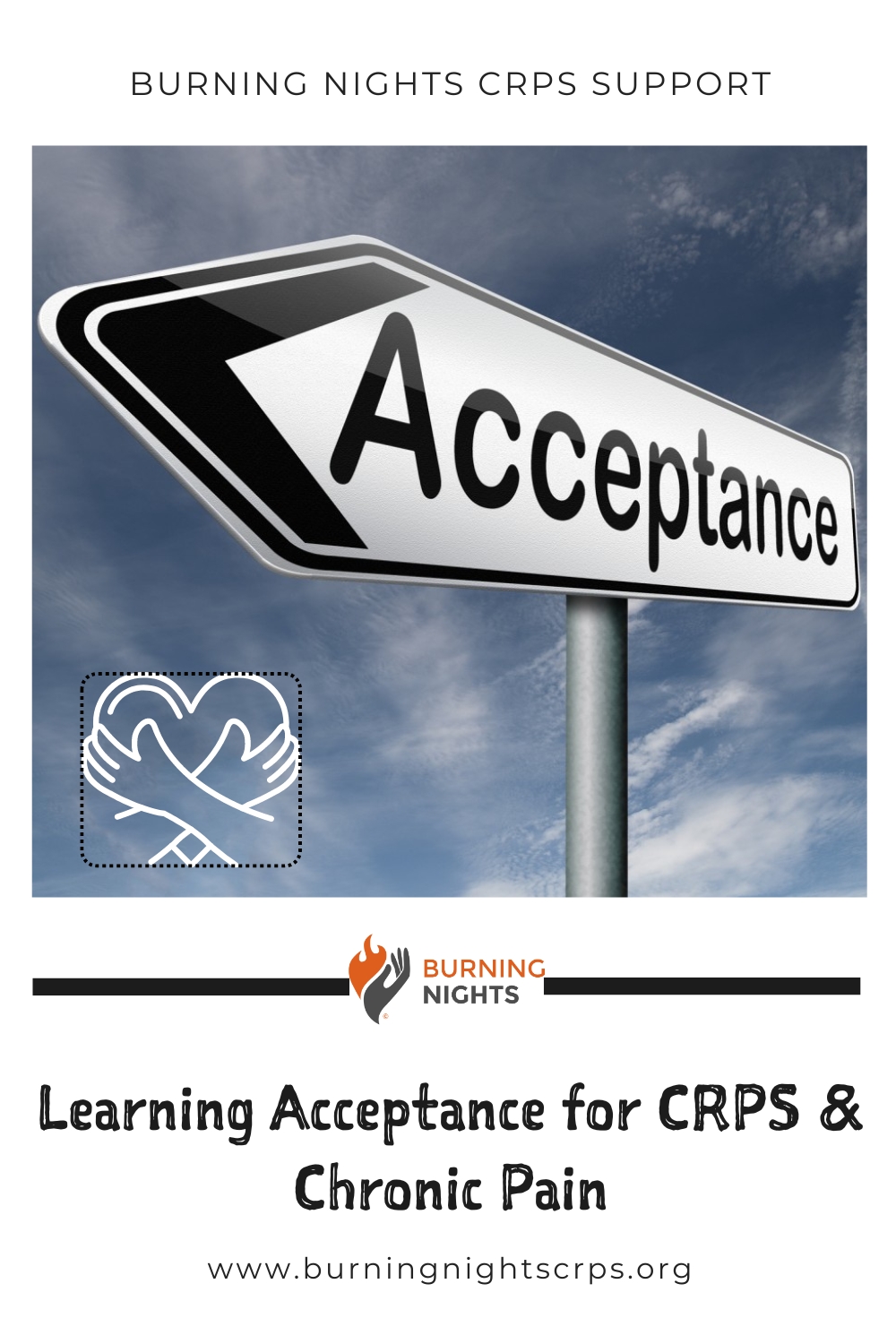
By accepting your CRPS or chronic pain, you have decided to accept that your way of life has changed and that your chronic condition is a very much permanent part of your life now. This is the one of the hardest things you will do when faced with a diagnosis of Complex Regional Pain Syndrome, chronic illness or chronic pain in general.
You need to learn to accept that you have your CRPS or chronic pain permanently and it can't be changed, but it can be managed so you can have some quality of life. This will be the most difficult thing to overcome in your 'new' life, living with a chronic condition like CRPS. It's important to remember that acceptance of your chronic illness isn't going to happen overnight.
When we talk about acceptance, we are not asking you to accept the high levels of pain that you may feel. We are talking about acceptance of your long term illness that you have and that there is no cure. Yet. Always have hope.
However, to finally accept your CRPS or chronic illness, you will go through various stages, just like you would following a major grief or loss. You have had a loss - the loss of your old life. You are in effect grieving for your past life.

When first diagnosed with chronic pain, patients will tend to completely avoid wanting to understand about it (McCracken, L.M), won’t want to find effective treatments, therefore almost blocking it out of mind. However, coming to terms with your CRPS or chronic pain is a vital process of living your life. Acceptance isn’t just a function of having a low level of pain (McCracken, L.M. 1998).
Some people will struggle to come to terms with their pain and not move on with their life. Others will do the opposite and be very open and optimistic and therefore will actively seek out treatments and want to live their life. Accepting your CRPS or chronic pain is not giving up in anyway and it is not a negative thing. Instead, think of acceptance as taking the next step in your post-diagnosis journey and taking your chronic pain with you.
According to McCracken, L.M. (Ruehlman, L. 2014), "Acceptance of pain is thought to reduce unsuccessful attempts to avoid or control pain and thus focus on engaging in valued activities and pursuing meaningful goals."
In recent research, Moore, H. et al. (2015) and in Cho, S. et al (2012) have shown that acceptance "…may be associated with better tolerance of pain."
Again, in some research studies, it has been shown that chronic pain acceptance, although difficult to achieve, is convincingly linked with better and more long term results including lessening the effects of stress and suffering.
According to Fish, R. et al. (2010), acceptance is "being willing to experience pain without trying to avoid it, control it or reduce it."
When you have any long term condition, such as CRPS or chronic pain, it always seems a very long road and you may think that your life is over and you can't carry on or you just simply want to give it all up. This is a common misconception.
Acceptance is not actually asking you to give it all up or that your life is over. Instead, acceptance for CRPS and chronic pain is giving you a chance to regain some quality of life and to continue with your life and your social activities, move on from trying to find that cure or specific treatment that will virtually make the CRPS or chronic pain disappear, and carry on despite the pain that you have.
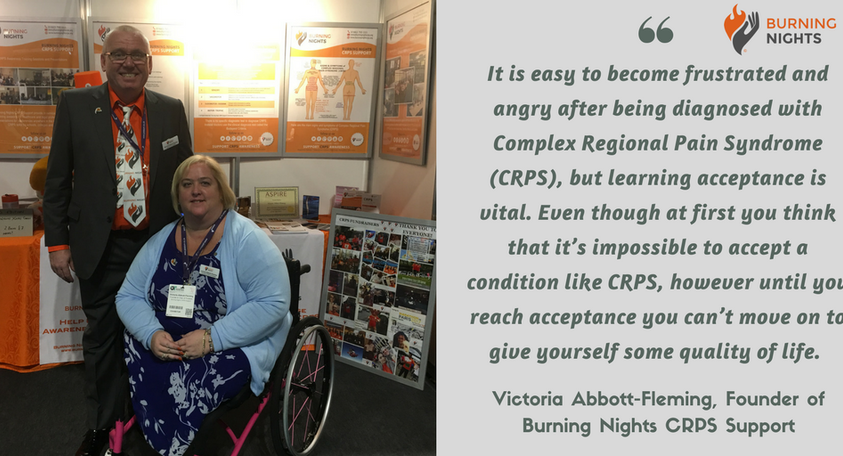
It will take time. Finding acceptance won't happen overnight. You must realise that it will also take some hard work on your part.
Have you had thoughts like...
All of these thoughts are quite natural after being diagnosed with a condition like CRPS or another chronic illness. But they will not help you to move your life forward with your CRPS or chronic pain. It is only with accepting that there won't be a cure or treatment tomorrow or next week or next month and there isn't another doctor or specialist who has a magic wand or perfect answer to help you that you can start to take steps towards the future.
Many people have looked everywhere - UK, USA, Europe, Australia - but have never found that perfect answer. If you learn to accept that your CRPS or chronic pain is here to stay and is real and your life is worth more than just trying to find that final answer that will get you out of all this pain, it is then and only then that you can move on despite the pain.
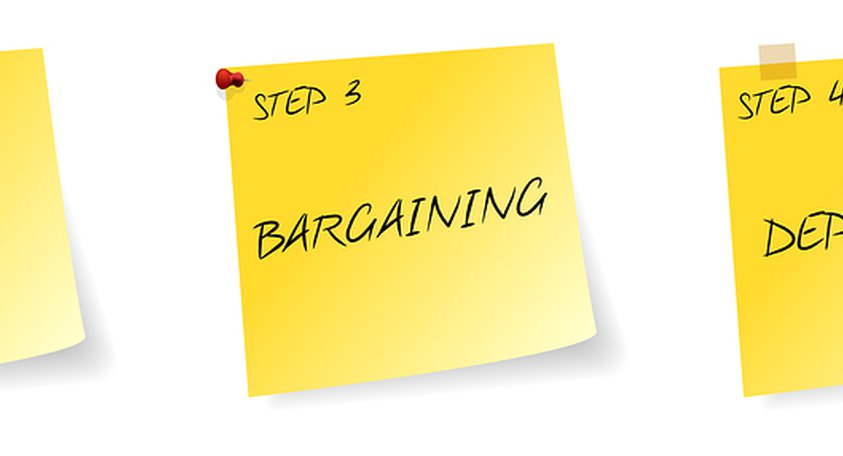
Acceptance of CRPS & Chronic Pain – 5 Stages of Acceptance | Burning Nights CRPS Support
According to numerous sources, there are 5 steps or stages of acceptance. They were developed by Elizabeth Kubler-Ross, mainly for grief and loss during her work with the terminally ill. However, it can be useful in understanding how you process the grief for the way your life was before the onset of your CRPS or chronic pain as you may go through the same stages.
The stages are not time bound and will not necessarily be experienced in any particular order. They are guide to show you the various stages that you may go through when faced with a diagnosis of CRPS or chronic pain.

Acceptance for CRPS & Chronic Pain – Denial | Burning Nights CRPS Support
Denial is the first stage you are likely to go through following a diagnosis of a chronic condition, like CRPS or chronic pain. This is also most likely the most well-known.
Have you ever had thoughts of...
These are all classic cases of denial. You are denying the fact that you and your life have been affected by this condition. When someone receives a diagnosis for something that will likely affect them for a long period of time or the rest of their life, as with CRPS, Fibromyalgia or CFS/ME, the first and most natural response is to deny its existence, deny it ever happened, or say that the doctor has got it all wrong.
There is no time frame for this stage. Denial can last as long as you allow yourself to have these thoughts and feelings. Due to having a deep sense of denial, some CRPS sufferers will deny the existence of their condition and as a result, they might not take the important and very necessary arrangements in finding treatment and seeing the right doctors for that condition.
According to WedMD, "As we move through the experience and slowly acknowledge its impact, the initial denial and disbelief fades."
The second stage is anger, which is an important part of the steps in achieving acceptance. You might find that you feel angry at your family and friends for not understanding or believing what you are going through, you may get angry at the doctor who diagnosed you for telling you that you have CRPS or chronic pain and that you have it for life, or your anger might be pointed towards the medical profession for not diagnosing you sooner.
Essentially, you try to find someone to blame for what has happened to you, whether it be your place of work, the doctors or medical profession, the surgeon or the person who caused the accident. You may have other feelings and find that you have an inability to find out information or comprehend the condition. At some time point, you might even experience anger towards yourself, perhaps wondering what you have done to deserve this or why has it got to be you.
Even though the anger stage of acceptance is common, it is important not to stay in this stage for too long. Anger can bring about stress, depression, bitterness or isolation from friends, family or loved ones, thereby causing you more problems and possibly even more pain.
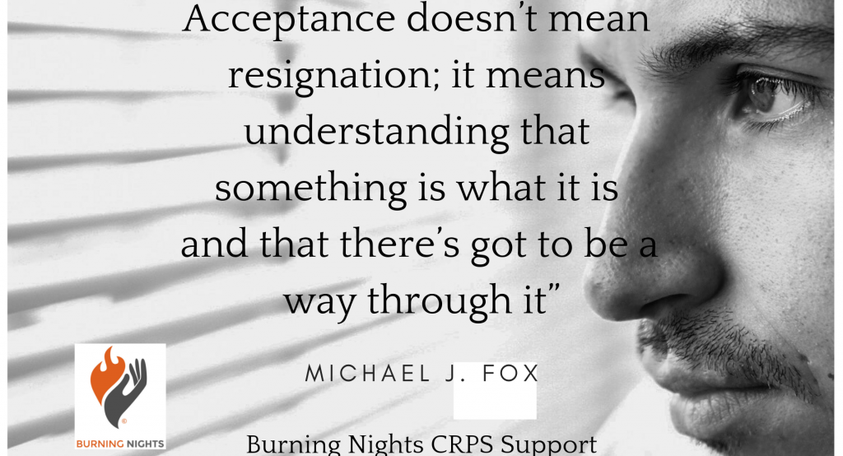
The third stage of acceptance is bargaining, where you make a deal or trade with yourself or God that if you do something good then your CRPS or chronic pain will go away or things will change in some way.
You are trying to find a way back to your old life and how things were for you before the CRPS or chronic pain. You may possibly have thoughts of what 'could have been done' to prevent your injury or chronic pain from occurring. Bargaining thoughts might include 'only one day or afternoon without medication will be OK', but it is important to remind yourself that these thoughts will not materialise or bring about real changes because there is no cure for CRPS or chronic pain.

Depression is the fourth stage of the cycle of grief and it is here that you have realised your CRPS or chronic pain won't go away, understanding that you have CRPS or chronic pain and that you have it for the rest of your life.
This stage can often be the most prolonged as it tends to be the most difficult to get through. With depression there can be feelings of sadness, loss, desperation, anxiety, isolation or vulnerability. People might begin to withdraw as they see little or no point in doing things, living, seeing or talking to friends, family or loved ones. It can feel as though there is no joy or love for life to be found, with no way out.
Depression can be all-consuming and take over a person's life. It is very important if you find yourself or someone you love experiencing feelings of depression, going deeper into despair, or having suicidal thoughts, that you seek medical attention right away.
When you enter this depressive stage following a diagnosis of CRPS or chronic pain, you are effectively grieving for your old life and the loss of all the things you used to enjoy doing. It is completely understandable to have these feelings and it is okay to have a cry or to feel sad - it is all part of the process. It is important to learn that you are bound to have your bad days, as well as your good days.
The process of acceptance won't be smooth sailing all of the time, it will take patience and understanding. It is at around this time that you might find that talking with other CRPS and chronic pain patients can provide you with a feeling that you are understood and you are not alone. One place you can do this is on the Burning Nights CRPS Support Forum.
Common Signs of Depression

Acceptance for CRPS & Chronic Pain – Acceptance | Burning Nights CRPS Support
The final stage of this grief process is acceptance. It is at this point that will you begin to realise that you have a limit to what you are able to do now in your new life and be able to move forward with that understanding. The aim of this step is to learn acceptance of your CRPS or chronic pain. You will have now found that you have accepted your condition into your life and it is a part of you that will remain for the rest of your life.
McCracken (1998) found that patients with more accepting responses to chronic pain showed better adjustment, as measured by the self-report of depression, anxiety, and disability.
Acceptance does not mean that your life is over and that you have to give everything up or give up looking for different treatments or a cure because of the CRPS or chronic pain, but that you have realised the reality of it and you can still look for different doctors or treatments or a cure.
Cho, S. et al (2012) stated that, given the intractable nature of CRPS-I, the findings suggest that patients with CRPS-I may benefit from responding to pain with acceptance.
Your new life will be different and the way you have to do things will be different to the way you did things before. Once you have understood that this is your new path, you can begin to heal emotionally and mentally. By incorporating your CRPS or chronic pain into things you do, it can help you to heal and start to take control back over your life instead of allowing the condition to continue to take it over.
Please try and remember that, just like other stages especially depression, you may feel down, upset, sad or depressed on one day and then have a good day the next. Not every day will be perfect and it is completely natural to feel depressed or sad or angry. The stages of acceptance do change and, just like CRPS, not everyone will go through every step the same way or even in the same order. Some people might not even go through every single step.
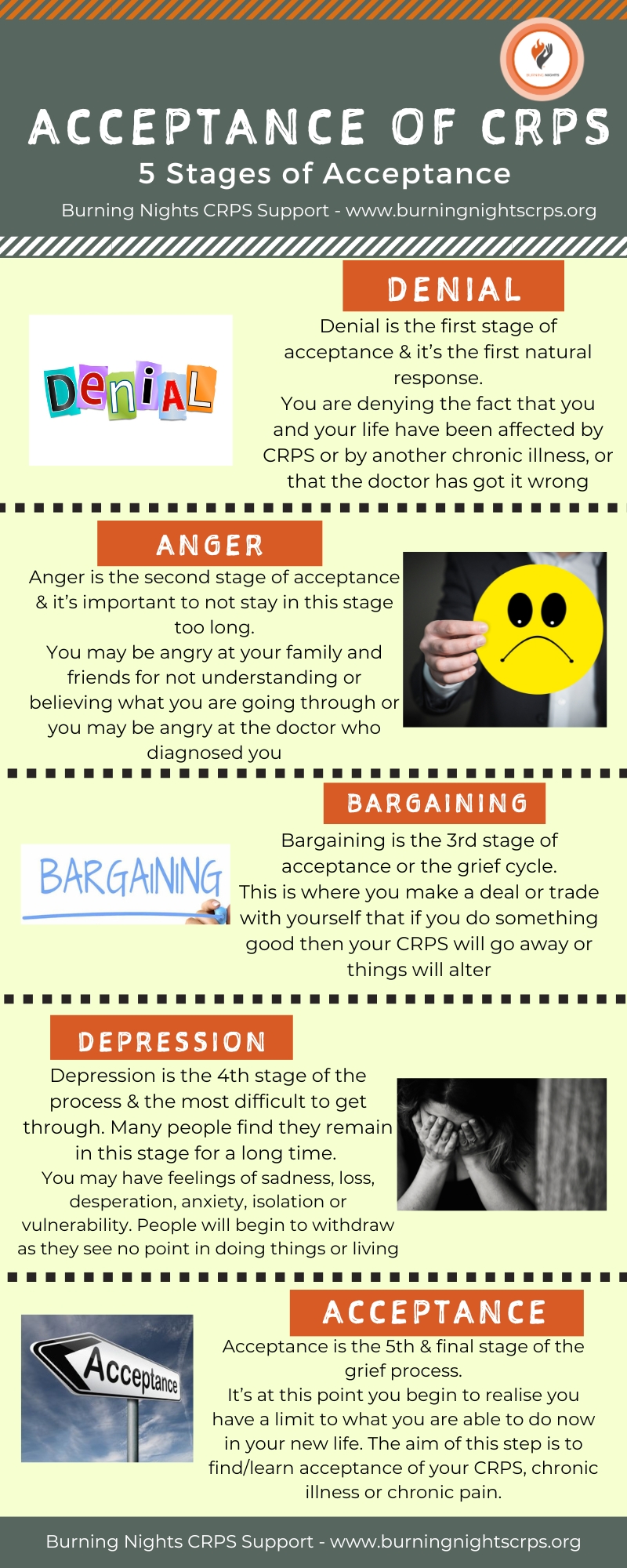
PLEASE REMEMBER: If you find at any time that you are staying in one stage especially the depression stage, seek medical advice and explain your feelings to your doctor or counsellor. They will try to help you to move on from that stage and towards acceptance. Remember, there are no time frames or instructions and there's no right or wrong way to reach your final aim of acceptance.
Hopefully, now that you have read this article about learning acceptance for CRPS and chronic pain, you can begin to realise or understand that it is totally possible to live your life, even with a chronic pain condition and that all those thoughts you've had since your incident occurred are perfectly normal. It a process that sufferers have to go though.
Read our article on Coping Strategies for CRPS & Chronic Pain
*This article is an information resource only. It is not intended nor implied that it is a substitute for medical advice or professional psychological treatment.*

Burning Nights CRPS Support has written a number of articles on living with Complex Regional Pain Syndrome and chronic illness. Here are some you may be interested in:

Last Updated: 09/07/2024
As the Founder of Burning Nights CRPS Support, I want to help all those affected by this devastating condition, including those living with CRPS, their relatives, partners, carers and friends. I'm also a barrister, advocate and have lived with Complex Regional Pain Syndrome (CRPS) since 2003. I am a bilateral (double) above knee amputee due to aggressive symptoms of CRPS. Please help spread awareness of this debilitating and life-changing condition. We need your support!
We use cookies to improve your experience. By accepting you agree to our cookie policy
 £
£
